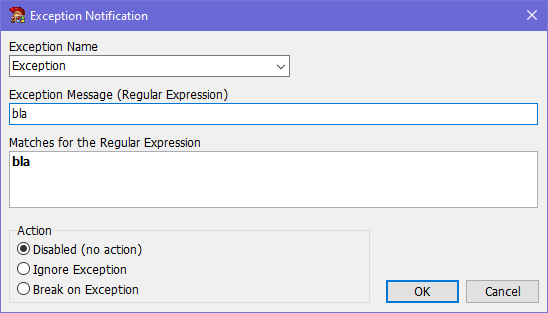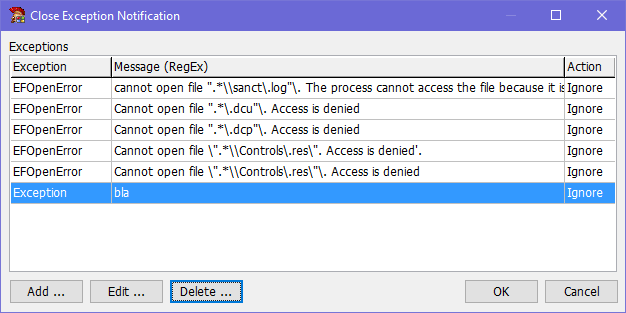I got into programming because I am lazy, I’d rather have the computer do the boring work than doing it myself. So it’s no wonder that I always liked Delphi and GExperts because both support my laziness.
Today I added yet another feature to save me a key stroke or mouse click: The “Close Exception Notification” expert.
You probably have encountered those libraries that always raise the same exception class on errors, or even worse, raise the generic Exception class instead of bothering to declare their own. And if I should guess, you have probably been guilty of doing that yourself (as I definitely have).
Why is that a problem, you ask?
Because you can’t easily ignore these exceptions during debugging. You always get this “Debugger Exception Notification” dialog, have to read it and decide whether you want to break and look at the code or ignore the exception:

There is this nice option to “Ignore this exception type”, but unfortunately ignoring the exception class “Exception” is rarely an option.
The same problem occurs with other rather generic exceptions like EFOpenError which you can’t really simply ignore but need to check for the file name.
So, what we need is a more finely grained filter based on the message.
Enter the new “Close Exception Notification” expert. It adds a “GExperts” button (I need a better caption) to the dialog above which lets you add filters for Exceptions based on class name and message. And since it was more convenient for me (more laziness), the message filter is a regular expression.

This button will call a configuration dialog which allows you to configure how to handle the current exception.

This dialog is mostly pre-filled if opened through the button on the “Debugger Exception Notification” dialog.
You first enter (there will be some kind of recently used list in the future) the exception class name and then a regular expression for the message. In the simplest case this can be the whole message (but beware of characters which have a special meaning in regular expressions, like ‘.’, ‘*’, ‘?’ or ‘\’). There is an additional input field which you can use to test whether the regex matches the message. When you are satisfied with your newly created rule, select the action to take automatically and press OK. The dialog will close and the action will be executed for the first time, e.g. the Ignore button will automatically be pressed.
The “Close Exception Notification” expert does not have a menu entry. But there is a configuration dialog which gives you a list of currently configured filters.

Unfortunately since this expert cannot directly modify the IDE code and I am not aware of any Open Tools API access to the exception notification, it has to hack the dialog. This results in the dialog being displayed for a short time before the expert “presses” the button for you. This is certainly not ideal but still better than not having it.
There is no GExperts release with this new functionality yet, so in order to get it, you will have to compile your own DLL.
If you want to discuss this article, you can do so in the corresponding post in the international Delphi Praxis forum.